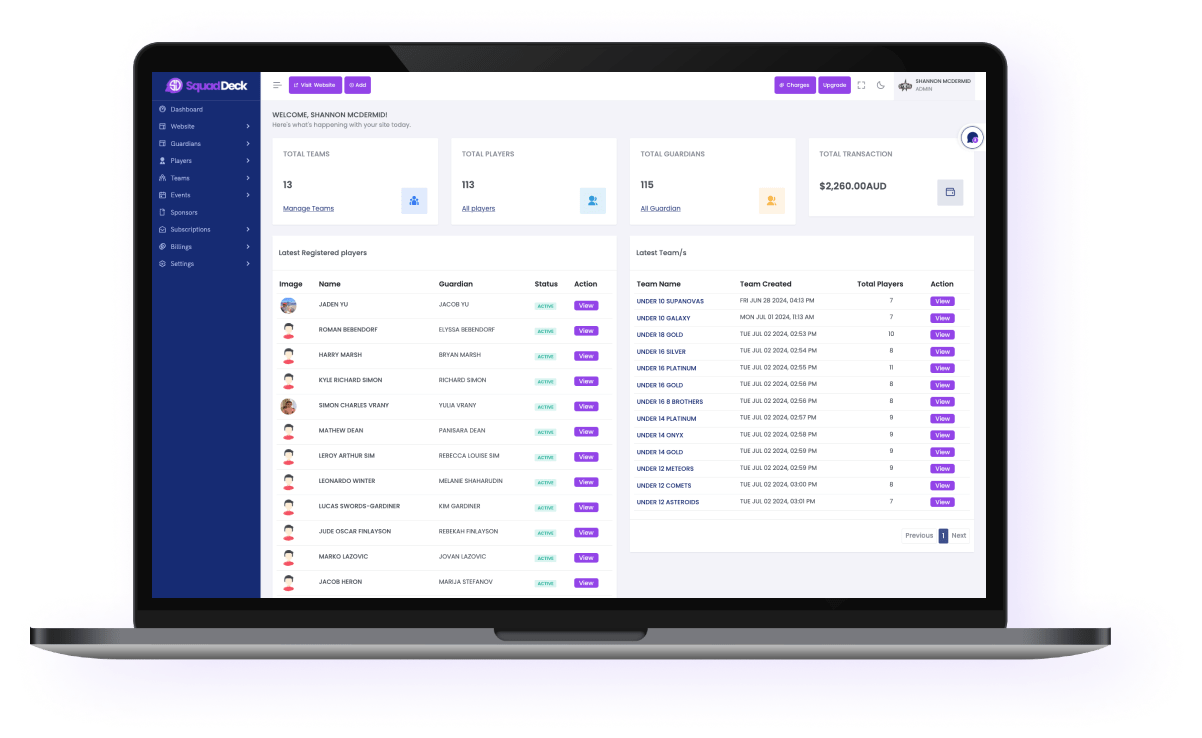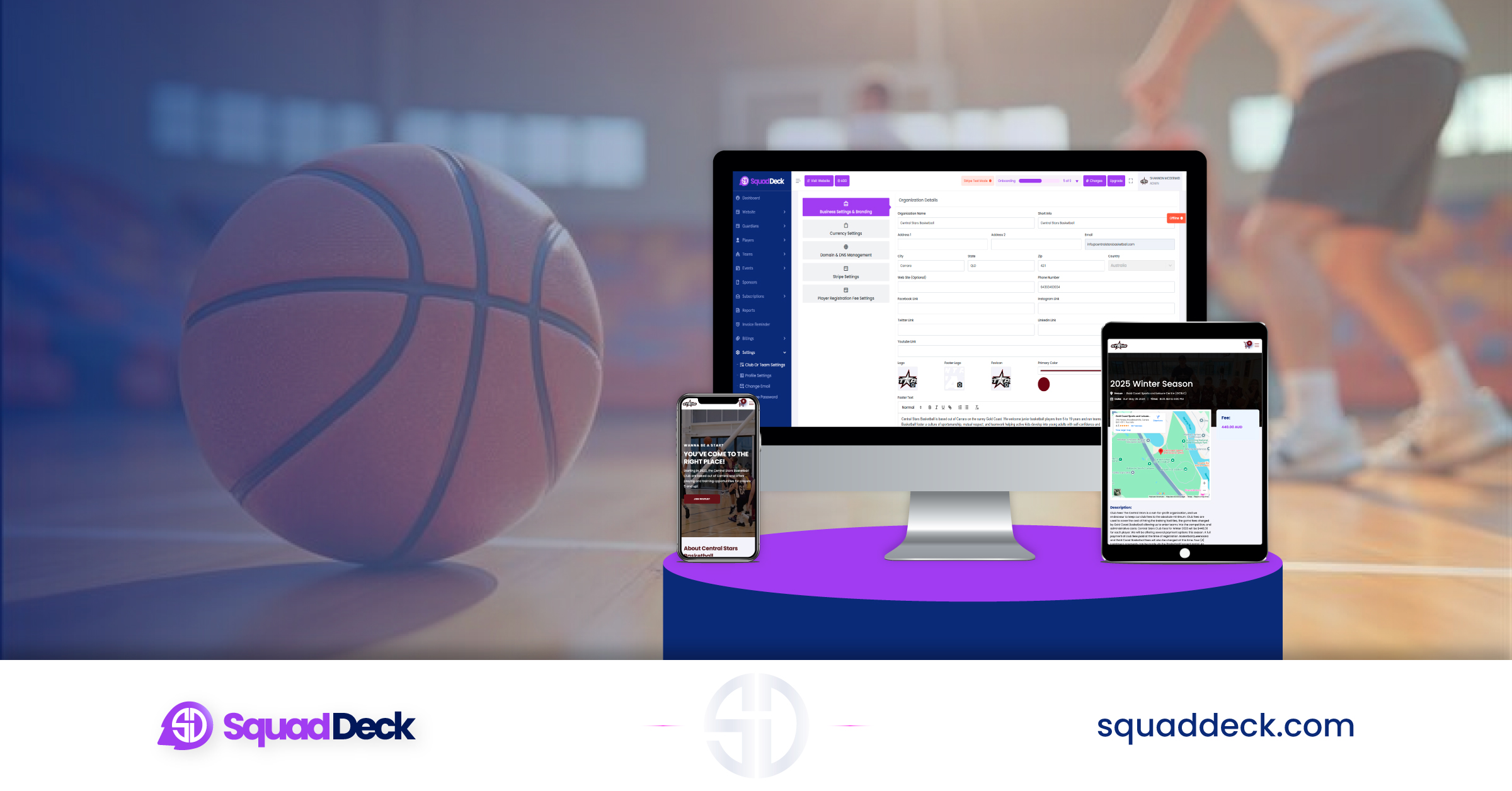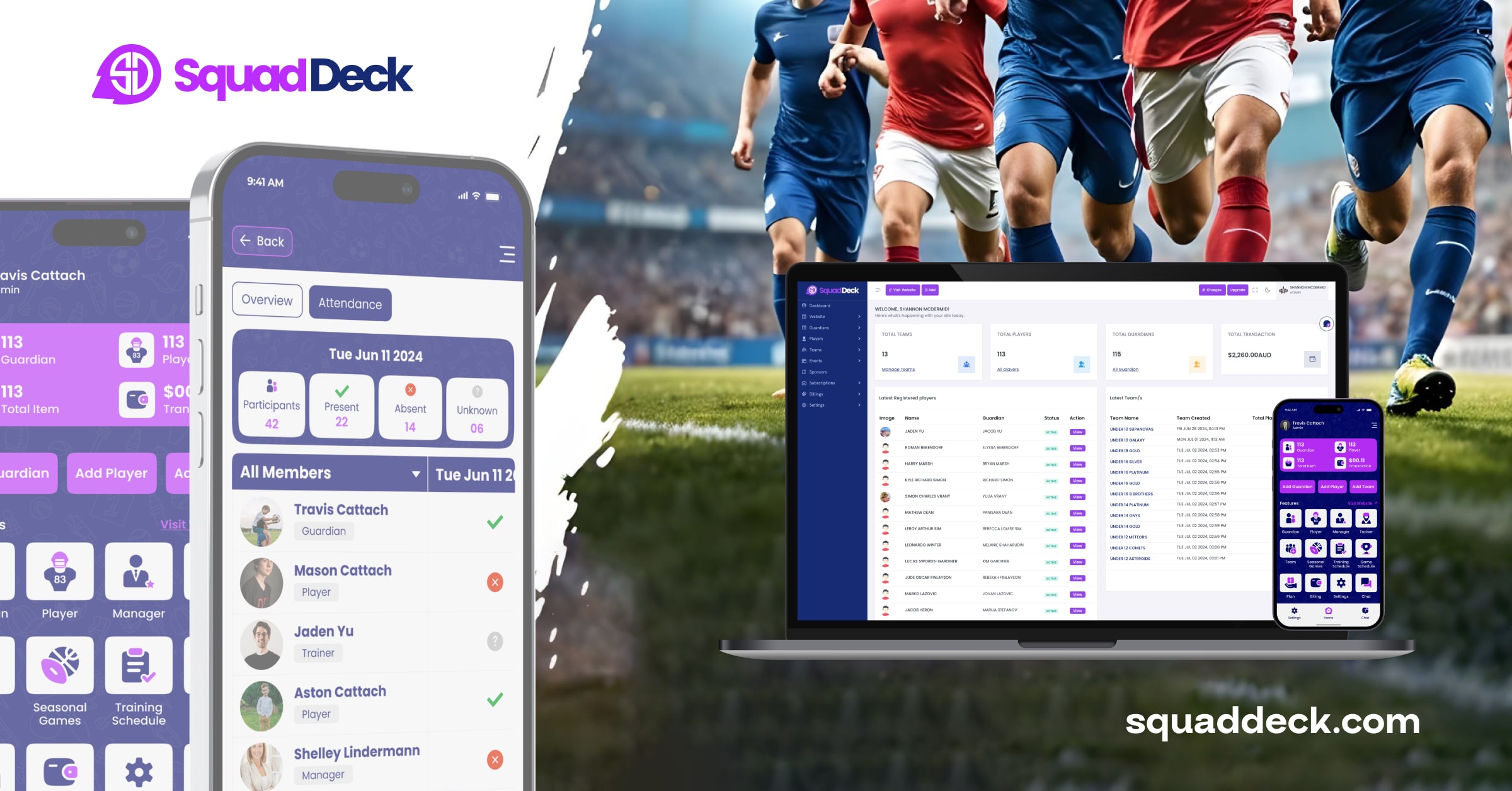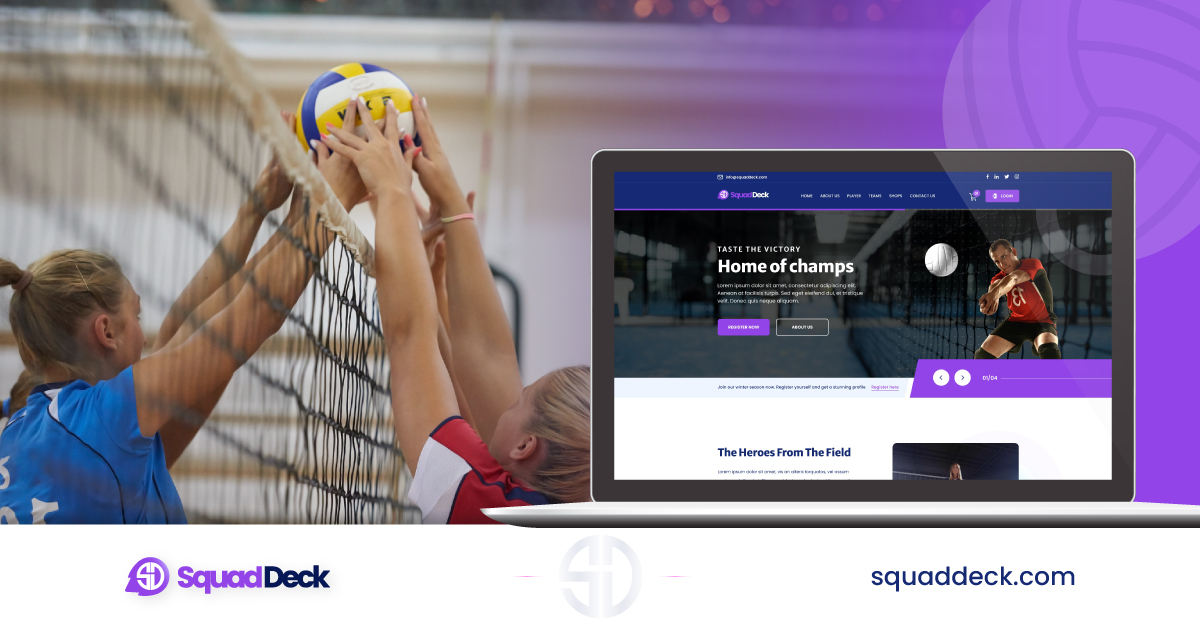Sports Event Management and Scheduling System for Sports Club
Sports event management and scheduling system plays a crucial role in the successful operation of any sports club or organisation. With the increasing complexity and demand of sports events, it has become essential to have a systematic approach towards event planning and management.
Importance of sports event management and scheduling system
An efficient sports event management and scheduling system can streamline the entire event management process, making it easier for sports clubs to organise, plan and execute successful sports events. The system can handle everything from scheduling games, practices and tournaments, managing registrations, payments and waivers, communicating with participants, to tracking attendance and generating reports. A reliable event management system can help sports clubs save time, reduce workload and increase efficiency.
Overview of sports clubs and their needs for event management and scheduling
Sports clubs are diverse organisations that range from youth sports teams to professional sports teams. Each club has different needs and requirements for event management and scheduling. Sports clubs need to manage their resources efficiently, including facilities, staff, equipment, and finances. They also need to ensure that they are meeting the needs of their athletes, coaches, and parents while providing a safe and enjoyable experience for everyone involved.
Brief explanation of the benefits of a good sports event management system
A good sports event management and scheduling system can bring a lot of benefits to sports clubs. It can help clubs to:
- Save time and resources by automating administrative tasks and simplifying the event management process.
- Increase efficiency by reducing errors and eliminating manual tasks.
- Improve communication with participants and staff through automated notifications and messaging.
- Enhance the overall participant experience by providing easy online registration, payment, and waiver management.
- Boost revenue through increased participation and improved financial tracking and reporting.
- Gain valuable insights through data analytics and reporting, allowing sports clubs to make informed decisions about future events.
In summary, an effective sports event management and scheduling system is essential for the success of any sports club. It can help streamline the event planning process, improve communication, enhance the participant experience, and ultimately, increase the overall efficiency of the organisation.
Key Features of a Sports Event Management and Scheduling System
Schedule creation and management
One of the most important features of a sports event management and scheduling system is the ability to create and manage schedules for events. This feature should allow for the creation of schedules that are easy to read and understand, and should also provide the ability to make changes and updates as necessary.
Integration with calendars and scheduling tools
The system should have the ability to integrate with other calendars and scheduling tools such as Google Calendar, Outlook, or iCal. This feature enables easy access to event schedules for users and also allows for syncing between different devices and platforms.
Automated scheduling and rescheduling
A good sports event management system should be able to automate the scheduling process, making it quick and easy to create schedules for events. In addition, the system should be able to automatically reschedule events in the event of a cancellation or change in circumstances.
Registration and sign-up
Another important feature of a sports event management and scheduling system is the ability to manage registration and sign-ups for events. This feature should allow for online registration and payment processing, as well as the ability to manage waivers and consents.
Online registration
The system should allow for online registration for events, making it quick and easy for users to sign up for events. This feature should also allow for the collection of important information such as name, age, and contact information.
Payment processing
The system should also be able to process payments for events, making it easy for users to pay for events online. This feature should allow for the collection of credit card information and other payment details.
Waiver and consent management
The system should also be able to manage waivers and consents for events. This feature should allow for the collection of electronic signatures and should also provide a record of who has signed waivers and consents.
Communication and Notifications
An effective sports event management and scheduling system should also provide tools for communication and notifications. This feature should allow for the sending of automated email and SMS notifications, as well as team communication tools.
Automated email and SMS notifications
The system should be able to send automated email and SMS notifications to users regarding events. This feature should allow for the sending of reminders, updates, and other important information.
Team communication tools
The system should also provide team communication tools, allowing for easy communication between coaches, players, and other team members. This feature should allow for the sending of messages and the sharing of files and other information.
Reporting and analytics
Finally, a good sports event management and scheduling system should provide robust reporting and analytics tools. This feature should allow for the tracking of attendance, revenue, expenses, and other important metrics.
Attendance tracking and reporting
The system should allow for the tracking of attendance for events, as well as the generation of attendance reports. This feature should also allow for the tracking of no-shows and other important attendance metrics.
Revenue and expense reporting
The system should also provide tools for the tracking of revenue and expenses for events. This feature should allow for the tracking of ticket sales, merchandise sales, and other revenue sources, as well as the tracking of expenses such as equipment rentals and other costs.
Performance tracking and reporting
Finally, the system should provide tools for the tracking of performance metrics for events. This feature should allow for the tracking of game scores, player stats, and other important performance metrics, as well as the generation of performance reports.
Implementation of a Sports Event Management and Scheduling System
Once a sports club has decided to implement a sports event management and scheduling system, there are several important steps that must be taken to ensure a successful implementation. These steps include planning and preparation, training and adoption, and evaluation and optimization.
Planning and Preparation
Needs assessment and system requirements: The first step in implementing a sports event management and scheduling system is to assess the needs of the sports club and identify the specific system requirements. This involves understanding the current event management process and identifying pain points or areas for improvement. It’s important to involve all stakeholders in this process to ensure that all needs are taken into account.
Budget and resource allocation: Once the system requirements have been identified, the sports club must determine the budget and resources needed to implement the system. This includes hardware and software costs, as well as any staffing or consulting costs that may be required.
Selection of vendor and software: With the system requirements and budget in mind, the sports club can begin the process of selecting a vendor and software solution that meets their needs. This may involve evaluating multiple options and conducting demos or trials to ensure that the chosen solution is the best fit for the club.
Training and Adoption
System implementation and customization: Once the vendor and software solution have been selected, the sports club can begin the process of implementing the system. This may involve customising the software to meet the specific needs of the club, such as adding custom fields or integrating with existing systems.
Staff and user training: It’s important to ensure that all staff and users who will be using the system are properly trained on its use. This may involve conducting training sessions or providing access to online training resources.
User adoption and feedback: Once the system has been implemented and users have been trained, it’s important to monitor user adoption and gather feedback to identify any areas where further training or system improvements may be needed.
Evaluation and Optimization
System performance monitoring and evaluation: It’s important to monitor the performance of the system to ensure that it is meeting the needs of the sports club and its users. This may involve tracking system usage and generating reports to identify any issues or areas for improvement.
User feedback and system improvement: User feedback is a valuable tool for identifying areas where the system can be improved. Sports clubs should encourage users to provide feedback and suggestions for improvements, and should work with the vendor to implement these changes.
Continual improvement and optimization: The implementation of a sports event management and scheduling system is not a one-time project, but an ongoing process of optimization and improvement. Sports clubs should continually evaluate the system and look for ways to optimise its performance and improve the user experience. This may involve upgrading hardware or software, adding new features, or improving existing workflows.
In conclusion, the implementation of a sports event management and scheduling system requires careful planning, training, and ongoing evaluation and optimization. By following these steps, sports clubs can ensure that they are able to efficiently manage their events and provide a seamless experience for their users.
How SquadDeck can help sports clubs to manage Sports Event Management and Scheduling System
SquadDeck is an all-in-one sports management platform that can help sports clubs manage their event management and scheduling system. With SquadDeck, sports clubs can automate the entire process of scheduling, registration, and communication, making it easy to manage all aspects of their events.
Here are some ways that SquadDeck can help sports clubs manage their event management and scheduling system:
Schedule creation and management: SquadDeck’s scheduling tool allows sports clubs to create and manage their schedules with ease. The tool integrates with calendars and scheduling tools, making it easy to keep track of upcoming events. Sports clubs can also set up automated scheduling and rescheduling, so that changes can be made quickly and efficiently.
Registration and sign-up: With SquadDeck, sports clubs can offer online registration and payment processing, making it easy for athletes and coaches to sign up for events. The platform also allows sports clubs to manage waivers and consent forms online, reducing administrative workload.
Communication and notifications: SquadDeck’s communication tool allows sports clubs to send automated email and SMS notifications to teams and participants. Sports clubs can also use the platform’s team communication tools to facilitate communication between coaches and athletes.
Reporting and analytics: SquadDeck’s reporting and analytics tool allows sports clubs to track attendance, revenue, and expenses for their events. The tool also provides performance tracking and reporting, allowing sports clubs to monitor the success of their events over time.
Overall, SquadDeck can help sports clubs to save time and resources, improve communication, and streamline their event management and scheduling system. With SquadDeck, sports clubs can focus on providing the best possible experience for their athletes and coaches, while also improving their bottom line.
Stay Connected With SquadDeck
Stay connected with SquadDeck for the latest news and updates about all Sports. Follow us on social media (Facebook, Linkedin) to get tips and strategies to help optimise your sports organisation website.
We value your opinion! If you have any query about our services, please take a moment to leave a comment below.
Remember, choosing the right sports club management software can streamline your operations and help your organisation reach its full potential. So take the time to find a software that offers the features you need to succeed.
Promoting your eCommerce platform is essential for attracting new customers and driving sales for your sports association. By utilising social media, sending email newsletters, and running targeted advertising campaigns, you can effectively promote your eCommerce platform and take your sports association to the next level.
In conclusion, sports event management and scheduling systems are crucial for the success of sports clubs. They help streamline the process of organising and managing sports events, ensuring that everything runs smoothly and efficiently. With the right system in place, sports clubs can save time and resources, reduce administrative workload, and improve the overall experience for athletes, coaches, and staff.
A good sports event management and scheduling system should have key features such as schedule creation and management, registration and sign-up, communication and notifications, and reporting and analytics. These features help sports clubs to create and manage schedules, facilitate registration and payment processing, communicate with teams and participants, and track attendance, revenue, and expenses.
The benefits of a good sports event management system include increased efficiency, improved communication, streamlined operations, better data management, and increased revenue. With the right system in place, sports clubs can focus on providing the best possible experience for their athletes and coaches, while also improving their bottom line.
If you are a sports club owner or manager, it is important to consider implementing a sports event management and scheduling system. With the right system in place, you can streamline your operations, reduce administrative workload, and improve the overall experience for your athletes, coaches, and staff.
There are many sports event management and scheduling software options available on the market, so it is important to do your research and find the right fit for your specific needs. Investing in a good system can be a game-changer for your sports club, helping you to save time and resources, improve communication, and ultimately, provide the best possible experience for your athletes and coaches. So, what are you waiting for? It’s time to take your sports club to the next level with a good sports event management and scheduling system.



















